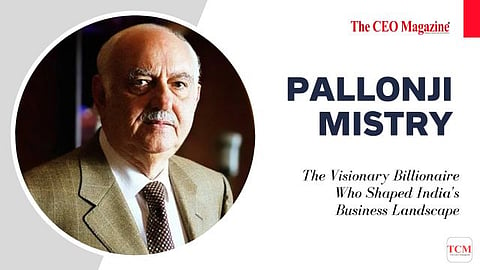
- News
- Women
- Magazine
- IndustryIndustry
- InsightsInsights
- Success Stories
- PublishPublish
- ContactContact
- Media KitMedia Kit

Pallonji Mistry
The Visionary Billionaire Who Shaped India's Business Landscape
Pallonji Mistry, an Indian-born Irish billionaire, left an indelible mark on India's business and construction landscape. As the chairman of the Shapoorji Pallonji Group and a major shareholder in Tata Group, he was a visionary leader known for his profound impact on the corporate world.
Pallonji Mistry was born on 1st June 1929 in Bombay (now Mumbai) into the illustrious Mistry family. Hailing from the Parsi community, he inherited a rich legacy of enterprise and business acumen.
The Mistry family's involvement in construction was legendary. Pallonji's father, Shapoorji Mistry, was the mastermind behind some of Mumbai's iconic landmarks in the Fort area, including the Hong Kong & Shanghai Bank, Grindlays Bank, Standard Chartered Bank, State Bank of India, and Reserve Bank of India buildings. This legacy laid the foundation for Pallonji's illustrious career.
Pallonji Mistry's association with Tata Group was a defining chapter in his life. It began in the 1930s when his father, Shapoorji Mistry, started acquiring shares in Tata Sons.
Over the years, this stake grew to a substantial 18.4%, making Pallonji the single largest individual shareholder in Tata Sons.
This strategic holding not only solidified his status as one of India's wealthiest individuals but also granted him significant influence in the workings of Tata Group, India's largest private conglomerate.
Pallonji Mistry wore multiple hats throughout his illustrious career. He held the position of chairman in the Shapoorji Pallonji Group, overseeing entities such as Shapoorji Pallonji Construction Limited, Forbes Textiles, and Eureka Forbes Limited.
He also served as the former chairman of Associated Cement Companies, contributing significantly to the cement industry.
However, Pallonji's influence extended beyond his own conglomerate. His son, Cyrus Mistry, served as the chairman of Tata Sons from November 2011 to October 2016.
Within the Tata Group, Pallonji Mistry was often referred to as the "Phantom of Bombay House" for his quiet yet assured approach to wielding power within the Tata empire.
Pallonji Mistry's wealth was nothing short of astounding. According to the Bloomberg Billionaires Index, his net worth was estimated at about US$30 billion in mid-2021.
Even at the time of his passing, it remained an impressive US$29 billion. He held the distinction of being the richest Irish billionaire and ranked as the 143rd richest person globally.
In 2003, Pallonji Mistry renounced his Indian citizenship to become an Irish citizen, a decision based on his marriage to Irish-born Pat "Patsy" Perin Dubash.
Despite his citizenship change, he continued to reside in Mumbai. The Mistry family's connection to Ireland also had roots in their love for horses, with Pallonji owning a sprawling 200-acre stud farm and a 10,000-square-foot home in Pune, India.
Pallonji Mistry's family included two sons and two daughters. His elder son, Shapoor Mistry, was responsible for running the Shapoorji Pallonji group, while his younger son, the late Cyrus Mistry, held the position of chairman of the Tata group for several years.
Mistry's elder daughter is Laila, and his younger daughter, Aloo, is married to Noel Tata, the half-brother of Ratan Tata.
In recognition of his remarkable contributions to trade and industry, Pallonji Mistry was awarded the Padma Bhushan by the Government of India in January 2016.
On 28 June 2022, Pallonji Mistry passed away in Mumbai at the age of 93. His demise marked the end of an era in India's corporate landscape.
Pallonji Mistry's legacy continues to inspire generations of business leaders and entrepreneurs, and his imprint on India's business world will endure for generations to come.
Follow us on Google News
